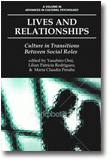
Lives And Relationships
Culture in Transitions Between Social Roles
Edited by:
Yasuhiro Omi, University of Yamanashi, Japan
Lilian Patricia Rodriguez, Universidad de La Sabana, Colombia
María Claudia Peralta-Gómez, Universidad de La Sabana, Colombia
A volume in the series: Advances in Cultural Psychology: Constructing Human Development. Editor(s): Jaan Valsiner, Niels Bohr Professor of Cultural Psychology, Aalborg University.
Published 2013
This book brings to cultural psychology the focus on phenomenology of everyday life. Whether it is in the context of education, work, or exploration of life environments, the chapters in this book converge on the need to give attention to complex realities of everyday living. Thus, a description of pre-school organization in Japan would be in its form very different from school organization in Britain or Colombia—yet the realities of human beings acting in social roles are continuous around the world.
CONTENTS
Preface of the Series Editor—Cultural Phenomenology and Social Relevance, Jaan Valsiner. Editors’ Introduction, Lilian Patricia Rodríguez Burgos, María Claudia Peralta- Gómez and Yasuhiro Omi. PART I: UNDERSTANDING RELATIONSHIPS IN EDUCATIONAL INSTITUTIONS. Living and Working Within the Institution of Schooling: Authority as Pedagogy of the Everyday, David Eddy Spicer and Harry Daniels. Thorns On My Tongue, Malcolm Reed. Transformation of Group Norms and Addressivity of Good Intention: A Field Study at a Japanese After-School Day-Care Facility, Yasuhiro Omi. COMMENTARY. Social Reproduction and Its Transformations: Relationships in Educational Institutions, Marcos Lanner de Moura and Danilo Silva Guimarães. PART II: RESOURCES AND THE BOTTOM LINE. Being a Hanidcapped Woman: Coordinating Social Roles in Everyday Living, Leonor Córdoba and Patricia Vaca. Between Formality and Informality: Subjectivity in Work, María Claudia Peralta-Gómez. Men Without Work: The Impact of Change in Social Roles Upon Marital Relations, Ernesto Martín Padilla, Stella de Uribe, and Martha Gaitán de Zarate. COMMENTARY. Work as a Promoter Sign, Ana Clara de Sousa Bittencourt Bastos. Experiences and Interpretations of Work in Public and Private Life, Jeanette A. Lawrence and Agnes Dodds. PART III: POWER AND ETHICS. Early Childhood Aggression: Changing Paradigms, Martha Rocío González Bernal and Elena Mara Minski. Understanding Cognitive Planning From an Idiographic Perspective: A Case Study, Lilian Patricia Rodriguez Burgos, Richard Rosero, Jennifer Rodriguez and Ana Maria Mojica Arango. Cognitive Planning and Everyday Practices: A Case Study, Lilian Patricia Rodríguez Burgos, Juan Giraldo, Diana Obando, Diego Romero, Ana Mojica, and Jennifer Rodríguez. COMMENTARY. From the Viewpoint of Studying Human Development in a Family Context, Reika Shoji. Studying Cognitive Planning Contextualized, Roncancio Roncancio Mónica. PART IV: CONTEXTUAL REALITIES: MOVING BEYOND THE SCHOOL. Bullying Beyond the School: Interactions, Beliefs, and Practices, Patricia Vaca and María Clara Rodríguez. COMMENTARY. Touching Realities: Meaning-Making on the Center Stage, Yuko Yasuda and Tatsuya Sato. The Use of the Internet and Social Well-Being in Adolescents, Ivonne Andrea Flórez, Olga Lucia Yepes, and Ernesto Martín Padilla. COMMENTARY. Adolescents and the Internet as a Hypercontext: Modeling Spaces of Life, Jytte Bang. Touching the Ground: How Symbolic Encoding Matters, Zachary Beckstead. COMMENTARY. Microgenesis of Meaning-Making Processes: Between Cognition and Ecology, Jytte Bang. GENERAL CONCLUSIONS. New Directions in the Study of Culture in Social Roles: Adulthood in Focus, Yasuhiro Omi, Lilian Patricia Rodriguez Burgos, and María Claudia Peralta-Gómez. About the Authors.
-
Paperback9781623964276
Web price: $62.04 (Reg. 72.99)
-
Hardcover9781623964283
Web price: $89.24 (Reg. 104.99)
- eBook9781623964290

- PSY030000 - PSYCHOLOGY: Research & Methodology
- PSY031000 - PSYCHOLOGY: Social Psychology
- SOC026000 - SOCIAL SCIENCE: SOCIOLOGY: General
-
 Culture, Work and Psychology
Invitations to Dialogue
Culture, Work and Psychology
Invitations to Dialogue
-
 Deep Loyalties
Values in Military Lives
Deep Loyalties
Values in Military Lives
-
 Drama of Multilingualism
Literature Review and Liberation
Drama of Multilingualism
Literature Review and Liberation
-
 From Dream to Action
Imagination and (Im)Possible Futures
From Dream to Action
Imagination and (Im)Possible Futures
-
 Home in Transition
The Cultural Construction of Heimat
Home in Transition
The Cultural Construction of Heimat
-
 Making of Distinctions
Towards a Social Science of Inclusive Oppositions
Making of Distinctions
Towards a Social Science of Inclusive Oppositions
-
 Ornamented Lives
Ornamented Lives

